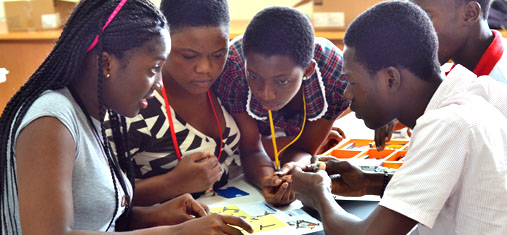A cross-section of Ghana’s developer community gathered at
BusyInternet, Accra, last Saturday, 14th
April as part of
Coders4Africa
(C4A)’s monthly Coders in Action series. This month’s event was put together in
collaboration with
Python African
Tour (PAT), and focus was naturally on using Python and allied technologies
to build useful applications for Africa and beyond. It was a day of fun
presentations, demos and networking that reiterated the tremendous progress
that is being built in the Ghanaian tech community. Present on the day were
established and emerging tech leaders such as
Emmanuel Okyere (
Hutspace),
Adu Saarah-Mensah (
PaasCo Africa) and
Jojoo Imbeah (
Suuch
solutions).
Selom Kossi
Banybah, Ghana Technical Manager for C4A coordinated affairs for the day.
 |
| Pre-event interactions |
The programme kicked off with
introductory remarks by
Kwame Andah
(via Skype) of C4A and
Gameli Adzaho of PAT.
Kwame spoke about the essence of the C4A programme, their joy at collaborating
with PAT and closed by giving hints on upcoming training opportunities. Gameli
also gave an overview of Python African Tour, their activities so far, what the
next plans of the tour in Ghana are (planned training events in Cape Coast and
possibly another in Accra). All the attendees then took turns to introduce
themselves and explain their connections to the Python language.
After the introductory remarks,
the main presentations took off but not as planned as Anne Mukundi of
PopKenya speaking from Nairobi, could not highlight on
PHP Code Ignitor as she was impeded by intermittent breaks in the Internet
connection.
 |
| Francis Addai enjoying his presentation on Pyramid |
Back home, PAT Kumasi
co-organiser and
mFriday Training
Coordinator
Francis Addai showed participants
how to play with Pyramid, a Python Framework. Taking time to explain key
advantages of Pyramid, chiefly its flexibility and versatility, Francis could
not hide his love for the framework. He rounded up his talk by demoing how he
is using Pyramid to build Geekry, a system that would allow developers to give
and receive feedback, giving them the impetus to improve the quality of their
work.
After Francis’ great
presentation, PAT Ghana trainer/organizer and CEO of Hutspace, Emmanuel Okyere,
took the stage to showcase RapidSMS, another Python web application framework
based on the Django. RapidSMS, he said, originally developed by
UNICEF and it extends the capabilities of
Django for SMS handling. Emmanuel went on to showcase sample apps developers
can build with the tool, emphasizing that there are lots of opportunities they
can exploit using RapidSMS.
 |
| Emmanuel walking attendees through RapidSMS |
Next, another PAT Ghana trainer,
Kweku Danso of
ilugi, stepped up to demo
Showcase, a web application that, true to
its name, showcases software built in Ghana on the web. He and his team mates,
Jojoo Imbeah and
Henry Addo, built Showcase
using the Django Python framework. Kweku’s goal for Showcase is to be a
one-stop shop for finding all the latest software developed in Ghana.
Another brilliant young dynamic developer,
Kwabena Antwi-Boasiako of
Parallax Consult, then took over from Kweku to
demo his innovation,
Gspeaks, which aggregates the
most interesting online stories Ghanaians care about. Gspeaks appears to be
highly targeted version of Reddit aimed at the Ghanaian web user. Kwabena built
his app with Ruby on Rails, an agile framework similar to the Python
frameworks.
Finally,
Ransford Okpoti rounded up events for the
day through a short presentation on Google App Engine. He started by explaining
the meaning of cloud computing concepts
IaaS, PaaS and SaaS,
pointing out the key offerings in each category. He then plunged into the
Google App Engine, showing how developers can leverage on Google’s
infrastructure to seamlessly deploy their apps on the Internet. He explained
that using the cloud service was more advantageous to lean teams as they may
not have the time or technical expertise to manage multiple servers on site.
 |
| Sarsah and Kweku discussing what next after the event |
After Ransford was done, group
pictures were taken and a brilliant day grudgingly came to an end as attendees
stayed on a bit to network, give feedback, ask questions and discuss ideas. Truly,
the Ghanaian tech scene is buzzing with useful activity as exhibited by another
splendid day of learning and skills building facilitated by Python African Tour
and Coders4Africa. It can only get better.
 |
| Group picture at the end of the programme |


























